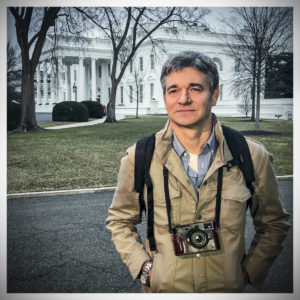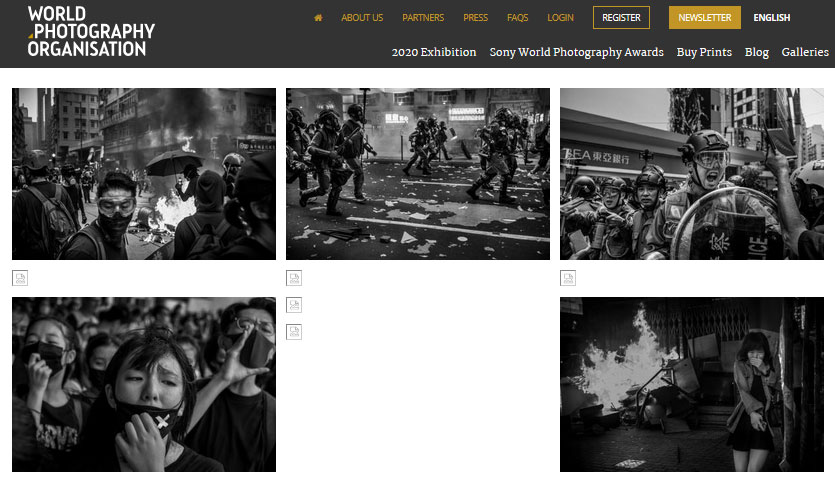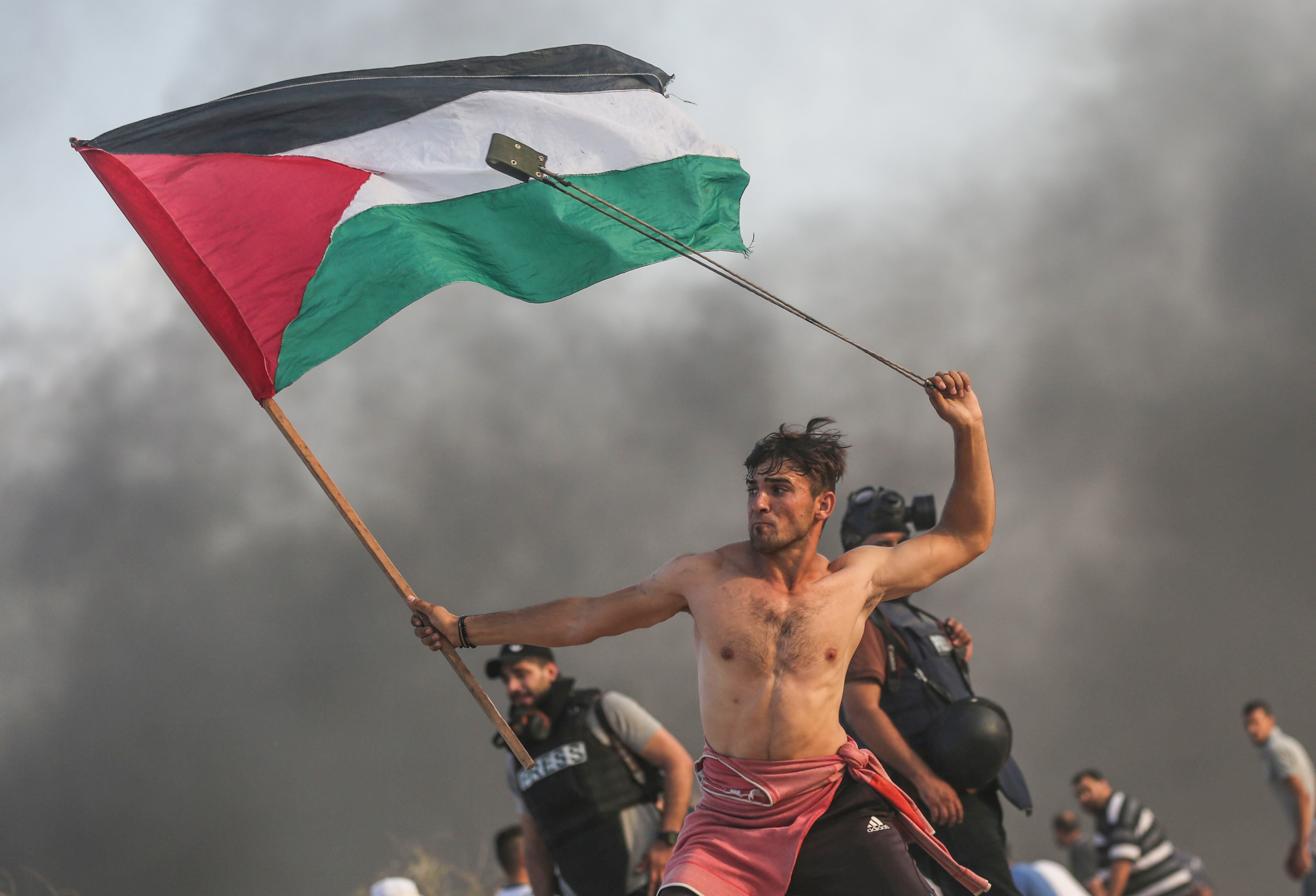American photojournalist, David Butow, has withdrawn his Hong Kong protest photo series from the 2020 Sony World Photography Awards, after the organisation removed five of his images due to their ‘sensitive nature’.

David’s black-and-white series, Battleground Hong Kong, was shortlisted by judges in the Documentary category, meaning it was selected among eight others as a category finalist. While Battleground Hong Kong didn’t score a top three placing, it was displayed in an online gallery and was to be shown in the travelling 2020 exhibition.
Shortly after the February 11 announcement of the finalists, which included two portrait series covering the protests, the World Photography Organisation (WPO) received a complaint and swiftly removed the online galleries of the three offending series.
Each series has a vastly different style. David’s series documents live action of the protests – masked youths assembling, riot police clashing with protesters, fires on the streets, arrests, and fear on the faces of both sides; Australian photojournalist, Adam Ferguson, shot a non-violent portrait series of Hong Kong protesters hiding their faces; and Hong Kong photographer, Chung Ming Ko, captured injuries sustained by protesters.
Widespread backlash was hurled at WPO on social media for censoring the finalist images, and the organisation responded by claiming it’s standard practice is to remove images following a complaint. The removal was attributed to the ‘sensitive nature’ of the photos.
‘Each year, following the shortlist announcements of the Awards there are cases in which we get notified about concerns regarding some of the images listed,’ a WPO spokesperson told Petapixel. ‘This can be anything that is deemed to contradict the competition’s terms and conditions. In each and every such case we take these concerns seriously and the images in question will always be temporarily made unavailable on our platform until we complete the review process.’
The WPO didn’t divulge more information regarding why the photos are deemed sensitive, or who would make such a complaint. The pro-democracy Hong Kong protests are a fight against the encroaching Chinese Community Party, so it’s likely that whoever complained is doing so on behalf of Chinese interests. It must also come from a position of power, as there is no recent record of WPO (or other prestigious contests) removing images due to political sensitivities.
WPO is a London-based organisation, but has strong connections to China. It has an office in Shanghai, where it also runs the annual festival, Photofairs. WPO also licenses its travelling exhibition, which has visited China at least seven times. And, of course, the contest’s major sponsor, Sony, has a dependence on China, both for manufacturing and access to the huge Chinese market.
David told Inside Imaging a WPO representative informed him about the review. ‘The representative didn’t elaborate much, but said there were political sensitives about the series. I didn’t ask anymore questions, and decided to wait for them to sort it out.’
After a few days some of the photos were restored online, however at least half the photos had been removed from the series by Ming Ko and David.

‘I called the representative and asked if that was the permanent situation and she said “yes, because the website is a global platform it was the most revised version of the photo essay they were willing to show”,’ he said. ‘If the pictures were going to be in exhibitions, there was one they were absolutely going to leave out.’
While David cannot speculate which photo this may have been, there is one photo that is clearly more ‘sensitive’ than others. It shows masked protesters marching, with posters behind them showing numerous Chinese officials, including president Xi Jingping, with an X covering their faces. Photos removed from the online gallery show riot police brutalising protesters. View the full series here.
‘I thought it was odd that what they were showing wasn’t even faithful to what their judges had selected,’ David said. ‘It’s not like I entered this project and they immediately said “oh, we really like this but there’s some pictures we can’t show”. The whole series was published in the shortlist, but at some point there was an intervention. I have no knowledge of who raised a concern, or what their motivations were, but my work was going to be taken out of context. It would be incomplete and didn’t reflect my intention of the project. That alone was enough for me to make the decision to withdraw.’
David asked the WPO rep if this had ever happened before, and apparently it has. While he’s hazy on the details, there was an image involving cows. A ‘sensitivity’ was supposedly flagged when the exhibition visited India, where the prevailing Hindu religion considers cows sacred, so the photo was removed.
David is disappointed by the turn of events, but adds the WPO rep was ‘very professional and respectful and handled it quickly and without further discussion’.
Inside Imaging trawled through the rules and there doesn’t appear to be a clear violation, especially considering previous category finalists have had works published that could be deemed critical of various governments and institutes.
Last year, for instance, Palestinian photojournalist, Mustafa Hassona, came third in the Documentary category for photos of Palestinian protesters in Gaza – ‘around 233 Palestinian protesters have been killed and 21,000 injured by Israeli snipers’.

In fact, this photo series encouraged the Washington DC-based photojournalist to enter his Hong Kong images, ‘looking at that [Mustafa’s photo essay] I thought this is a serious contest’.
‘One of the reasons I’m disappointed is that when we do this work we want people to see it. A reason photographers enter contests is to give the work more exposure,’ David concluded. ‘From that standpoint, having to withdraw my series and not have potentially as many people see the work, that’s unfortunate. I thought it was more important for me to preserve the integrity of the intent of my project, and the context of it – to have it seen properly, rather than edited.
‘A series may be edited because there’s not enough space, or formatting, or even aesthetic reasons. But that wasn’t the case here, this was edited for other reasons.’
Battleground Hong Kong just won the News category of the 2020 Eyes of History contest, hosted by the White House News Photographers Association.
WPO’s full statement to Petapixel
World Photography Organisation champions photography in all its forms and the Sony World Photography Awards is a celebration of photography from across the globe. The aim of the Awards is to acknowledge artists on the quality of their photographs and the technical excellence of their photography as well as providing photographers with a platform which assists in furthering their careers.
Each year, following the shortlist announcements of the Awards there are cases in which we get notified about concerns regarding some of the images listed. This can be anything that is deemed to contradict the competition’s terms and conditions. In each and every such case we take these concerns seriously and the images in question will always be temporarily made unavailable on our platform until we complete the review process.
It is our responsibility to consider the views of our audience alongside the photographer’s vision. The delicate balancing act this entails sometimes leads us to the difficult decision of removing a selection of images from a series. We deeply regret not to be able to present the full entry as submitted by photographers, however we feel it best to showcase a selection of the work and to continue to promote the photographer.
It is the decision of the photographer whether they wish to accept the curation to fit the terms of the competition or to withdraw their application to the Awards. We are incredibly saddened when a photographer decides to withdraw their work but fully respect and support their position.





As an editor, publisher and photo-journalist whose images have been published all over the world – including China in the past – I would like to denounce the WPO’s censorship of valid photo coverage of an event of international significance. Some of the best photos ever have been taken in conflict situations – what gives the WPO the right to be judge jury and executioner on this matter? The images are either worthy of an award or not – irrespective of subject matter. WPO’s stance is pusillanimous and immature and, being headquartered in London – the home of freedom of the press – I am amazed that this has occurred. Sony appears caught in the WPO’s weakness but if they concur with the decision, effectively dictating what images can be taken on their cameras once sold and entered in awards – every professional should reconsider whether Sony should be part of their kit.